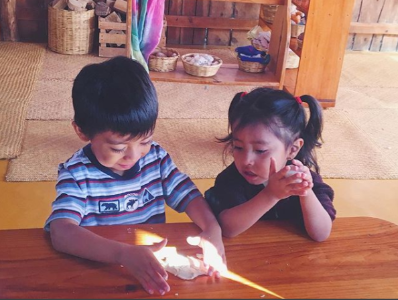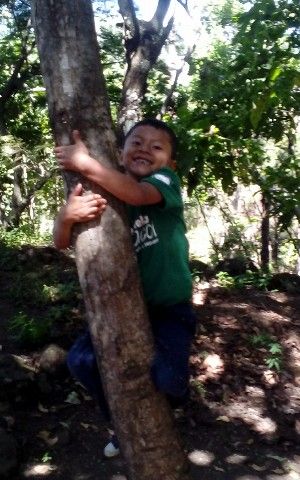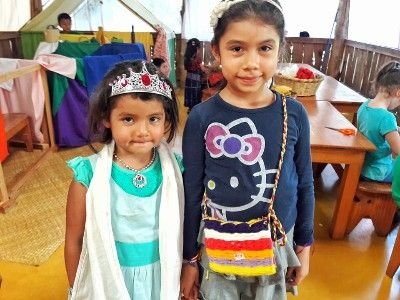Storytelling
I spent 2012-2017 as a Waldorf Early Childhood Educator. Last year I decided to step back from teaching for a variety of reasons, but I retain a deep love and appreciation for early childhood and the Waldorf pedagogy. It's safe to say that I learned at least at much as the children under my care, and I like to think that's the mark of a true teacher: one who knows that learning and growth are so important that they never end. The things I learned in that role could fill volumes, and if you get me going I might go all over the map!

But today I'd like to talk about storytelling. I loved storytelling. Like, really loved it. It probably doesn't hurt that I've been a bookworm ever since I could read, but done in this context, it became pure magic. Us Waldorf teachers are rather unconventional when it comes to early literacy: it's pretty much a no-no. There were no books in my classroom, though there were many rich language and imaginative experiences. Abstract intellectual learning is initiated at first grade; up until that point it's all about learning (and leading) by example, participating in meaningful work and partaking in imaginative play. Honor the phase that children are in during early childhood and don't expect them to be anything but young, active, imaginative, curious beings. Anytime I told a child what to do and did not live up to that idea, I was remiss in my teaching. Mostly, it was adult-initiated meaningful activity and child-led free play. Which is not at all as simple as it sounds, but that's a whole other post.

But storytelling. Man, I've been missing that. There's no real way to convey the experience in writing, but I'll try.
You gather the children (3-6 year olds) into the circle. I always found that creating a physical boundary helped--they're physical beings and if you want to focus the concentration, don't leave a disperse space. Sing a song and play a finger-game to help them focus. This is one of my favorites as it takes them from motion to calmness [disclosure: it's in Spanish, as I taught in Spanish]
Soften the vibe and convey how special this moment is by lighting a candle. Then tell the story. And really tell it--don't just recite it. Learn the story beforehand and love it, make it your own, have your own images and connection to the story and let them shine through in the telling. Don't over-dramatize it: this takes away the child's ability to create their own connections and images. But don't think that not sensationalizing it means that it's inert: love that story! Let it live through you.
And yes, some children get fidgety. Some stories are really for the 3-year olds, some for the 6-year olds, some for all, and some for one child in particular who is struggling with an issue and could use a loving and artistic example of how resolve their challenge. But when done right, eyes will glaze over and jaws will loosen as they lose themselves in the beautiful images and deep meaning conveyed in what you're offering them. It's pure love and magic when you get it right (and even when you don't get it quite right).
I'd like to share with you all a story that I wrote for the start of the school year, when I anticipated some nerves and fear from the children starting school and leaving home for the first time. It's simple and brought in a lot of images which the children of my area are familiar with and could connect to, and it's something that I'm proud to have created for them.
Little Chick Hatches From Her Egg
One fine day, when the sun was shining and there was a soft breeze, Red Hen stepped out of her henhouse and thought to herself, "today is the perfect day to lay my egg."
And so she began to scratch the ground, gathering leaves and grasses that she could use to make a comfortable nest. When the nest was all ready, Red Hen settled down in it to await her egg. The wind tickled her a bit between her feathers, but Red Hen did not mind: she had an important job to do, and could not allow herself to be distracted. And when all of a sudden she laid her egg, Red Hen jumped up onto her two feet and looked down at it for a moment, and then quickly sat down again. She did not want her egg to get cold! It was a good egg: big, round, and brown. By day, she delighted in watching the butterflies and dragonflies flitting about amidst the sunbeams, and by night--if she was lucky--she saw the flower fairies dancing on the blossoms.
And inside of the egg, Little Chick began to grow. At first she was very small, but each day she grew a little. Little Chick was happy inside of her egg; it was warm there, and all the sounds of the world reached her softly.
But it happened that one day, Little Chick realized that she was not comfortable inside of her egg anymore. She had grown quite a bit, and her egg was now too small for her. Little Chick did not want to leave her egg, for she felt so safe and happy there. So she decided that it did not matter if she was cramped, she would not leave. And day after day she continued to grow, until one day--CRACK!--her egg began to split. Little Chick was still a bit scared of what awaited her outside of her egg in the big wide world, but she could no longer stay inside. And so she began to peck at the shell with her beak until her egg broke completely open.
When Little Chick emerged from her egg at first she looked down, then she looked all around, and finally she looked up. And do you know what Little Chick saw? She saw Red Hen, which her fluffy feathers, smiling down at her. And Little Chick was so happy that she had left her egg at last, to meet her mother and the beautiful world that awaited her.

All photos are Escuela Caracol's and from their website here: www.escuelacaracol.org
Hooray for storytelling! Even better than books in many ways... Such an important ancient tradition practiced by every culture in the world!
both my kids go to the school at this school that colleen taught at. she was by far my kids favorite teacher. i know the article isnt about this...but i feel those that read this need to know that the person writing is more than just writing concepts...she is every parents hope for there child in a teacher!!!
Wow thank you @buttcoins! It means a lot to hear that. I hope you guys are all doing well--hugs to the little ones!
@originalworks
The @OriginalWorks bot has checked the text of this post and it appears original!
To call @OriginalWorks, simply reply to any post with @originalworks or !originalworks in your message!
I enjoyed this post @colleenthurber... We did homeschooling for a while and I have to say it was great fun to do the art / craft activities. Being a rather academic person, however, I was always rather too worried about them lacking the literacy and numeracy need to function in society... But I do appreciate the importance of play / discovery and listening...
Glad you liked it! How old were the choldren you were homeschooling?
I've witnessed Colleen's storytelling first hand and can tell you that it is very powerful. Her stoic poise and steady rhythmic voice transported me back to my childhood.
Is that you Mike?
Here's another Waldorf-lover. Doesn't work for everybody out here in the north western Europe, because of too many ego issues at school management level and in my personal case, it doesn't work too well with autistic children unless you throw in a healthy handful of special needs methods. (Classes in urban settings may be too big, too).
The rompompom song is wonderful in Spanish! If that doesn't concentrate the mind in living pictures nothing will!
I am not sure "abstract intellectual learning" is ever initiated, though, at Waldorf! I love how the alphabet is taught with letters as living entities in their own right. People worry that the child will never learn to spell, but before you know it the happy learner will write the most amazing assignments that testify to the original and authentic soul every child possesses. All Waldorf children, in principle can "go all the way" to do well at university. But as I said, it's not for every child, and problem behaviours are not cured miraculously by applying these teaching methods. Waldorf cannot be considered a dumping ground for children with poor aptitudes or wishy-washy parents. Waldorf in its essence is sorely misunderstood unless you study the development of the inner child, who is more than their brain.
I am so delighted to discover Anthroposophical presence here on Steemit! (Saw a part of the Goetheanum complex pass by, yesterday, on a photographer's blog gabyoraa)